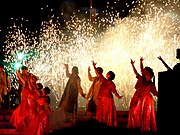Portal:Hindi cinema
The Hindi cinema portal

Hindi cinema, popularly known as Bollywood and formerly as Bombay cinema, refers to the film industry based in Mumbai, engaged in production of motion pictures in Hindi language. The popular term Bollywood is a portmanteau of "Bombay" (former name of Mumbai) and "Hollywood". The industry is a part of the larger Indian cinema, which also includes South Indian cinema and other smaller film industries.
In 2017, Indian cinema produced 1,986 feature films, of which the largest number, 364 have been in Hindi. , Hindi cinema represented 43 percent of Indian net box-office revenue; Tamil and Telugu cinema represented 36 percent, and the remaining regional cinema constituted 21 percent. Hindi cinema is one of the largest centres for film production in the world. Hindi films sold an estimated 341 million tickets in India in 2019. Earlier Hindi films tended to use vernacular Hindustani, mutually intelligible by speakers of either Hindi or Urdu, while modern Hindi productions increasingly incorporate elements of Hinglish.
The most popular commercial genre in Hindi cinema since the 1970s has been the masala film, which freely mixes different genres including action, comedy, romance, drama and melodrama along with musical numbers. Masala films generally fall under the musical film genre, of which Indian cinema has been the largest producer since the 1960s when it exceeded the American film industry's total musical output after musical films declined in the West. Dadasaheb Phalke's silent film Raja Harishchandra (1913) is the first feature length film made in India. The first Indian musical talkie was Alam Ara (1931), four years after the first Hollywood sound film The Jazz Singer (1927).
Alongside commercial masala films, a distinctive genre of art films known as parallel cinema has also existed, presenting realistic content and avoidance of musical numbers. In more recent years, the distinction between commercial masala and parallel cinema has been gradually blurring, with an increasing number of mainstream films adopting the conventions which were once strictly associated with parallel cinema. (Full article...)
Selected article
Mother India is a 1957 Hindi epic film, written and directed by Mehboob Khan and starring Nargis, Sunil Dutt, Rajendra Kumar and Raaj Kumar. A melodrama, Mother India is a remake of Mehboob Khan's 1940 film Aurat. It is the story of a poverty-stricken village woman named Radha who, amidst many other trials and tribulations, struggles to raise her sons and survive against an evil money-lender. Despite her hardship, she sets a goddess-like moral example of what it means to be an Indian woman, yet kills her own criminal son at the end for the greater moral good. She represents India as a nation in the aftermath of independence. The film ranks among the all-time Indian box office hits and has been described as "an all-time Indian blockbuster" and "perhaps India's most revered film". The film won the National Film Award for Third Best Feature Film in 1958. Mother India belongs to a small collection of films, including Kismet (1943), Mughal-e-Azam (1960) and Sholay (1975) which continue to be watched daily throughout India and are considered to be definitive Hindi cultural classics. The film was India's first submission for the Academy Award for Best Foreign Language Film in 1958 and was chosen as one of the five nominations for the category.
Did you know...
- ... that in the 2008 Bollywood film Krazzy 4, actor Hrithik Roshan (pictured) performed an "item number" for the first time?
- ... that Kaash was the last Hindi film in which Kishore Kumar did playback singing?
- ... that the 1955 Hindi film Vachan marked composer Ravi's debut as a film music director?
Subcategories
Selected biography
Selected image

WikiProjects
Recognised content
Topics
Awards: Bollywood Movie Awards (defunct) • Filmfare Awards • Global Indian Film Awards (defunct) • International Indian Film Academy Awards • National Film Awards • Screen Awards • Star Guild Awards • Stardust Awards • Zee Cine Awards
Institutions Asian Academy of Film & Television • Central Board of Film Certification • Directorate of Film Festivals • Film and Television Institute of India • Film City • Fox Star Studios • National Film Development Corporation of India • Satyajit Ray Film and Television Institute
Lists: List of Bollywood films • Film clans • Highest-grossing films in overseas markets • Highest-grossing films
Things you can do
- Add
{{portal|Hindi cinema}}to the See also section of Bollywood film-related articles. - Tag the talk pages of Bollywood film related articles with the {{WikiProject Film|Indian-task-force=yes}} banner.
- Collaborate with other participants at Wikipedia:WikiProject Film/Indian cinema task force.
- Cleanup: A cleanup listing for this project is available.
- Rate the Unassessed Bollywood articles in the Indian cinema task force.
- Cleanup needed
- Bot-generated cleanup listing • Hindi films and plagiarism • Ramoji Film City • IIFA Awards • IIFA • Anand Bakshi • Ajay Devgan • N. T. Rama Rao Jr.
- Requested articles
- List of missing Indian Films (see also lists of Indian films for redlinks) • Beary Cinema
- Expansion needed
- Draft articles: Tulu cinema • Anahat (film) • Prakash Jha • Central Board of Film Certification • Filmfare Awards South • Kerala Film Critics Association Awards • Amitabh Bachchan • Gabbar Singh • Sanjay Dutt • Hindustan Photo Films • Sanskrit cinema
- Citations needed
- Central Board of Film Certification
Related portals
Associated Wikimedia
The following Wikimedia Foundation sister projects provide more on this subject:
-
Commons
Free media repository -
Wikibooks
Free textbooks and manuals -
Wikidata
Free knowledge base -
Wikinews
Free-content news -
Wikiquote
Collection of quotations -
Wikisource
Free-content library -
Wikiversity
Free learning tools -
Wiktionary
Dictionary and thesaurus























